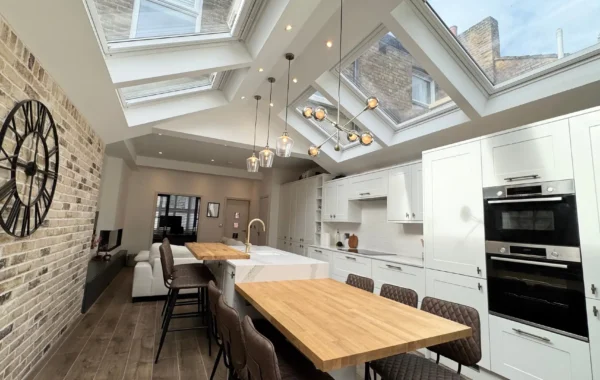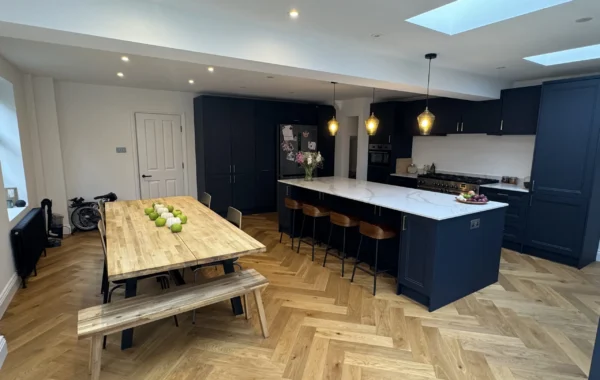The UK construction industry is undergoing a significant transformation, with a growing investment trend moving away from London and into other regions. This shift is driven by multiple factors, including government policies to level-level economies, rising land and labour costs of capital, and a renewed focus on developing underutilized areas. This blog explores the opportunities this regional shift presents and how construction companies can benefit.

Crest Projects specializes in designing and constructing bespoke new builds that are tailor-made to meet our clients’ specific requirements. From the initial design stages to final completion, we work closely with you to ensure every detail reflects your vision. Our experience in creating innovative and energy-efficient homes sets us apart, allowing us to build homes that are not only beautiful but also environmentally conscious.
The Rise of Regional Development
London has long been the epicentre of UK construction activity. However, this dominance is gradually decreasing as regions outside the capital emerge as key growth areas. The government’s ambitious ‘Levelling Up’ agenda, a beacon of hope for regional development, has been instrumental in driving this change. Significant infrastructure investment is being funnelled into the North of England, the Midlands, and other underdeveloped areas. For example, HS2, the high-speed rail project, is expected to boost connectivity and economic growth in cities like Birmingham, Manchester, and Leeds, sparking a surge in construction projects.
Similarly, the West Midlands Combined Authority has launched a range of initiatives to revitalize urban areas, such as the £1 billion Birmingham Smithfield development, which includes housing, retail, and commercial projects. These initiatives provide construction companies with new opportunities to participate in large-scale urban regeneration efforts. For instance, the redevelopment of the Birmingham Smithfield area has already attracted major construction firms and is a testament to the potential of regional projects
Affordable Land and Lower Costs
One of the primary factors driving the regional shift is the rising cost of land and labour in London. Developers and investors increasingly seek more affordable alternatives as property prices and construction costs continue to soar in the capital. Cities like Manchester, Birmingham, and Leeds offer significantly lower costs, making them attractive locations for both residential and commercial developments. This affordability provides a sense of financial security and confidence in the investment potential of these regions.
The North of England, in particular, has seen a boom in residential construction, with Manchester becoming a hotspot for apartment developments and large-scale infrastructure projects. The Northern Powerhouse initiative, designed to rebalance the UK’s economy, has further encouraged regional investment, creating new opportunities for construction companies to expand their operations.
New Housing Opportunities
With housing shortages still a pressing issue across the UK, many regions outside London are targeted for residential development. The government’s affordable housing initiatives push developers to build more homes in underserved areas. As a result, towns and cities in regions such as the North West, East Midlands, and South West are experiencing a surge in new housing projects. This surge in new housing projects presents a promising growth opportunity for the residential construction sector.
For example, the Wolverhampton area recently opened bids for a £1 billion housebuilding framework, attracting nationwide attention from significant construction firms. This project is part of a broader effort to address housing shortages outside London, particularly in regions with high demand for affordable homes.
Commercial and Industrial Growth
The rise of e-commerce and the changing retail landscape have also contributed to the regional construction boom. There is increasing demand for logistics hubs, warehouses, and distribution centres across the UK, particularly in regions with excellent transport links. Cities like Leicester, Coventry, and Bristol see many commercial construction projects designed to support the growing e-commerce industry.
Moreover, as more businesses seek to relocate operations outside of the congested and expensive capital, the construction of new office spaces, business parks, and industrial facilities is on the rise in regional hubs. This shift provides a unique opportunity for construction firms specializing in commercial and industrial developments
Challenges and Considerations
While the regional shift presents numerous opportunities, it also comes with challenges. One of the critical concerns is the availability of skilled labour outside London. Many regions face shortages of workers with the technical skills needed to support large-scale construction projects. This has prompted some companies to invest in apprenticeships and training programs to build a local workforce.
Additionally, regional developers may need help with planning and regulatory hurdles, which can delay projects and increase costs. Understanding local planning regulations and building solid relationships with local authorities will be critical for success in these regions.
Conclusion
The regional shift in UK construction offers many opportunities for companies expanding beyond London. With government backing, affordable land, and a surge in housing and infrastructure projects, regions like North England, the Midlands, and the South West are becoming hotspots for construction activity. By capitalizing on these opportunities, construction companies cannot only diversify their portfolios but also significantly increase their profits. This is a chance to contribute to the country’s balanced development while also growing your business.
For businesses ready to adapt to this shift, the future of construction lies beyond the capital’s borders.

Premium Loft Conversion in Putney: Transforming Homes with Crest Projects
One of the key benefits of a new build is the ability to incorporate the latest in home technology and sustainable building practices. Whether it’s energy-efficient heating systems, smart home features, or eco-friendly materials, a new build allows for a forward-thinking, future-proof design. At Crest Projects, we integrate these elements seamlessly into the construction process, ensuring that your home is ready for modern living.
Our team manages every aspect of the project, including obtaining planning permissions, working with architects, and handling all construction phases. This comprehensive service ensures that the process is stress-free for you, with clear communication and updates at every stage. We believe that building a new home should be an exciting and enjoyable experience.




